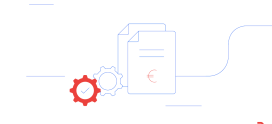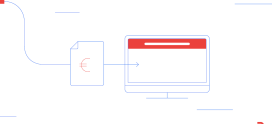24. June 2020
Digitization is what we make of it

Self-propelled cars, intelligent voice assistants and constant accessibility – our digital world seems to be an unstoppable avalanche that is threatening to overwhelm us soon. For many, this means: escape instead of attack. But isn’t the magic formula more about exploring the added value of technology and rethinking the world rather than burying one’s head in the sand?
An essay* by Jana Treptow
6:30 a.m.: Loud and much too early we are once again torn from our dreams by our alarm clock. Completely drunk asleep and still tied up in our dream world, many of us then probably reflexively reach for their smart all-rounder.
While some try to silence him for just a moment by wildly tapping on their display, others swip to “switch off alarm clock” as if it were the most natural thing in the world, open the app with the blue “f” like in autopilot and are catapulted at breakneck speed directly from their dream world into the digital spheres by the multitude of information.
Pressure, pressure and even more pressure
Back on the hard ground of the facts, we think of the upcoming deadlines for further education, the many private projects and the ever-lengthening to-do list at work – especially we Germans are masters at lamenting about our stressful and fast-paced everyday life. At work, too, the tasks, pressure and speed seem to be increasingly getting to us. According to a survey conducted by the insurance and financial advisory company Swiss Life in cooperation with the opinion research institute YouGov,two out of three Germans complain about a high level of stress in their job.
But is it surprising if we don’t even give ourselves the time immediately after waking up to perceive our surroundings and our feelings and to become really “awake”? There is almost nothing more beautiful than waking up in the morning while the sun gently tickles the tip of our nose, we perceive the wonderful scent of freshly roasted coffee beans in our nose and feel how our body snuggles up to the mattress and looks forward energetically to the upcoming events of the day. By the way, the smell of coffee is not only simply fabulous, but also increases our motivation and strengthens our cognitive abilities. These are the findings of a 2018 study published in the Journal of Environmental Psychology.
Why do we grant ourselves these almost magical moments so rarely when they are so good for us? Why do we have to send the first e-mail before the first coffee and look around in the social media? What is so important about it that it can’t wait until after breakfast? The stress that we keep complaining about is something we do ourselves. Maybe there are also little males who tell us that the first mails and messages have to be answered before the actual start of the day. But then they have forgotten me, willy-nilly or not, when passing on information.
Things were better! Before?
in former times the devil on our shoulders would perhaps now claim that everything was better in former times and that digitalization with its oh so great technologies is to blame for all the evils; and the rapid technological progress is slowly but surely driving our humanity into the abyss. But why do we increasingly have the feeling that we are not up to the digital change?
While inventions such as the railway, the car or the telephone took decades to fully integrate into people’s everyday lives, the computer, smartphone and Internet made it in much less time. Today’s society is no longer satisfied with having a mobile phone. It must be newer. It has to be faster. Be better. And be better than the others. Companies are literally exposed to this consumer pressure, so there is an enormous speed in the technological arms race, and we are trying to gallop behind that speed.
It’s hardly surprising that, with all the fast pace of life, many people like to remember the times when everything seemed to be better. Many a nostalgic person then likes to remember the era of the Walkmans: “Back then, the boys recorded their favourite mix tape in candlelight. This was then heard up and down until the tape started to play. So they picked up a pencil and laboriously rubbed the tape salad back on.”

Yes, the glorification of our past is quite understandable. Especially with our media coverage of uncovered data leaks, dangerous security holes – and of course numerous artificial intelligences (AI), which will soon take away our work and cyborgs will take over the world. No wonder that the apparent impression arises that everything was better in the past. But maybe we should take a look behind the scenes and not just look at the topic on a superficial, negative level.
If we look at digitization in a more differentiated way, we notice that it and its algorithms provide us with massive support in everyday life. In the Essen University Hospital, for example. There, intelligent AIs assist the doctors during operations. Why? That’s easy to explain. Artificial intelligences do not always have to take on a human-like form, with two sweet rolling eyes, a nose, a mouth and two helping arms. Often it is simply small machines that look completely inconspicuous as a conventional device, but often have big plans. For example, robot-assisted operating systems have the decisive advantage over us humans that they work tremor-free and with millimetre precision. The use of these small miracle technologies is not primarily about replacing people, but rather about supporting the staff in their work so that patents can be helped even more competently and patients can recover more quickly.
Or in the automotive industry. The vast majority of traffic accidents are due to human error. If we had cars that communicate with each other using sensors, calculate our routes using algorithms and then transport us autonomously to our desired destinations, road safety on the roads would increase significantly.
According to the ADAC, there were 3059 road deaths in Germany alone in 2019. Although the number is as low as never before, it is still 3059 people too many. But it is not only the increasing safety factor that speaks for autonomous driving. Passengers could sit back and make good use of their free travel time and also increase their comfort because they would not have to keep their eyes on the road and traffic all the time. And incidentally, the optimized traffic flow would also result in lower CO² emissions and thus less environmental pollution.
In our everyday work, intelligent software helps us to revolutionize our error-prone and tedious analog work processes. If, for example, we could access our work material at any time and from anywhere without first having to tediously search through our folders, this would not only save time and nerves, but we would also be one step ahead of our competitors because we could act quickly and flexibly.
If Virtual Reality (VR) continues to gain momentum as it is at present, we may in future be able to meet with our business partners without actually being physically present. Processes would be simplified and made more efficient. Above all, however, the behavior would have a very positive effect on our climate and the environment. If we could use VR to initiate business transactions, we would no longer have to board a plane for a one-hour customer appointment, but would meet our counterpart as a hologram in virtual space. We would also be more efficient because we would be able to serve more customers in less time without the miserable cucumbering across the country.
Deceleration, where are you?
These futuristic scenarios of the working world, which the view into our crystal ball shows, already have a certain charm, don’t they? But in our private lives, digitalization still seems to make us want to pursue the idea of “higher, faster, further”. That this brings with it a stressed mind and a restless spirit is hardly surprising.
In order to escape this, more and more travel offers are being offered that promise a mobile-free time, hotels in the mountains where there is no WLAN or the “Zen Mode” in the mobile phone, which denies you access to the system for a certain period of time. All this in order to finally deal with ourselves again and put the smartphone on the back burner. Sounds promising at first.
I wanted to know how much these promises actually slow down our everyday life and decided without further ado to try the Zen mode of my smartphone. In my circle of friends, I was always the one who made a big noise when it came to deceleration. It would be no problem for me if I woke up one morning on a desert island without this devilish thing aka smartphone. So I should be able to cope with the experiment easily. Or so I thought.

Then came the aforementioned Day X. The dare, so to speak. I easily set a “Zen time” of one hour and pressed this button, completely euphoric, when my smart all-rounder with a black screen fell silent. “Great” I thought and, motivated and in activated relaxation mode, dedicated myself to my favourite book. After about ten minutes, my bubbling fridge decided to disturb me in my Zen mode. It became louder and louder and started to whimper in a shrill tone. Lost in thought, I went to my mobile phone to start music and drown out the whimpering. When I tried to pick it up, I remembered: “Wait, you’re in Zen mode. You can’t open your music at all.” Frustrated, I dropped back on the sofa and read on. After a short time the whimpering of my fridge became so penetrating that I put the book away and decided to clean my kitchen, completely annoyed.
There was really not much to notice of the initial relaxation now. After the work was done, I typed on my digital all-rounder in rage to try to escape this mode somehow. In vain. Instead, the display lit up and an apparent motivation popped up: “Chill out and relax. You have 39 relaxed minutes to sit back and relax. You’re doing great!” “Thirty-nine fucking minutes left” I thought. I took a deep breath so as not to just “accidentally” pepper my cell phone off the table in a rush, surrendering, made myself a delicious cup of tea and took a hot relaxing bath.
When progress threatens to become faster and faster and we are driven to do as much as possible in as short a time as possible, it is up to us to press “pause”, come down and make a pit stop. Whether at work, at home or on holiday – opportunities abound. We just have to seize them.
“The” way does not exist
As with almost everything, there are two sides of the coin when it comes to digitisation and digital change. Our world and our society are in a constant state of change. Thanks to Henry Ford, repetitive assembly line work has been revolutionised, Carl von Linde advanced the development of the refrigerator, and Steve Jobs ensured that from 2007 onwards, many of us will be walking around with biting apples that not only allow us to talk and write, but also to work productively. Over the years we have changed and constantly developed. We will continue to do so and that is a good thing. Jobs and professions have become obsolete and new fields of work have emerged.
Logging off the social channels, shopping only offline and paying only with cash is one way to get out of this digital dilemma. But is it really the solution to escape the plight of digitalization altogether? It is time to say goodbye to our black-and-white thinking and instead to look beyond our own noses and realize the tremendous opportunities and potential that are emerging from the digital transformation. For education and science. Society and environment. The economy. Health. And ultimately: for all of us.
Digitalisation is not an enemy that tries everything to destroy us. Digital technologies such as autonomous vehicles, artificial intelligence and humanoid robots are our future, helping us to move forward and not stand still. Digitalization, what we make of it. And if we learn to approach new things cautiously but with curiosity and to see our fear not only as a negative but rather as a positive catalyst, we can only win.
* An essay is a treatise that deals with a literary or scientific question in a concise and sophisticated form. (Duden)



